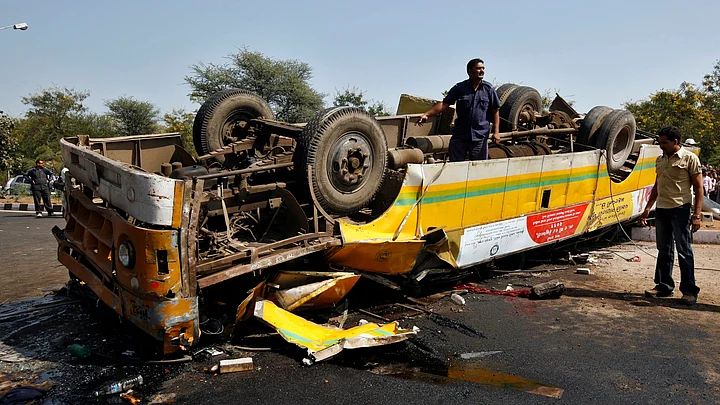June 3, 2015 marks the first death anniversary of former Union Minister Gopinath Munde.
The incident jolted the newly-formed Narendra Modi-government into making several promises – in an attempt to stand apart from the prevailing sense of complacency that had been seen in previous governments dealing with road accidents before.
Yet, one wonders, a year on, how much has really changed.
Of Promises Then and Now
Days after senior minister Gopinath Munde of the then newly sworn-in NDA government died in a road accident on June 3, 2014, Nitin Gadkari announced that the old Motor Vehicle Act will be replaced by a new one in line with advanced international practices to enhance road safety.
In a month’s time we will re-draft the Motor Vehicle Amendment Bill in sync with six advanced nations – USA, Canada, Singapore, Japan, Germany and the UK, and thereafter will introduce it in Parliament.
- Union Minister of Road, Transport and Highways, Nitin Gadkari in June 2014.
One year and multiple failed deadlines later, a fifth draft is still awaited and the bill might just get to see the light of the day in the monsoon session, though officially the government has refused to set a timeline.
The third version of the draft, that was released earlier this year, had increased penalties and made some revisions on the powers of the proposed National Road Safety Authority. Road safety activists called it the “most acceptable” version. It included safeguards to protect all class of road-users including non-motorised and vulnerable road-users such as pedestrians, children and cyclists and other features.
However, the Draft Road Transport and Safety Bill, as it exists now, is far from satisfactory according to activists, with some of them suggesting the old MV Act may just do a better job if it is implemented properly.
At least under the Act, a tribunal decided on the amount of compensation a victim’s family was entitled to. Under this version of the Bill, even that has been taken away. Some fines have been cut down by 90 per cent.
– Piyush Tewari, SaveLife Foundation
The Dilution
The original draft of the bill proposed to step up punishments for rash driving including the provision of seven years of jail if negligent driving resulted in the death of a child, the latest version brought it down to at least one year. The fine has been brought down from Rs 3,00,000 to Rs 50,000.
Penalty for first time offenders in case of over-speeding was reduced from Rs. 15,000 to Rs. 2,000.
Also, the maximum compensation a road accident victim’s beneficiary will receive from insurance companies will be no more than Rs 15 lakh going by the fourth draft of the Bill.
Insurance lobbies, transport sector lobbies, auto mobile manufacturing lobbies and others are pressuring the government to dilute stringent measures that were earlier suggested by stakeholders.
– Piyush Tewari, SaveLife Foundation
The Repercussion
The Planning Commission in a 2014 report had estimated that the annual cost of road crashes in India could be around 3% of GDP. That’s Rs. 3.8 lakh crore!
In numbers, 1.37 lakh Indians died in road accidents in 2013 according to National Crimes Record Bureau Statistics data.
Children below the age of 14 years contribute about 5.31% of all traffic fatalities in India. 65.6% of all fatalities are among the productive age group of 15-44 years.
(At The Quint, we question everything. Play an active role in shaping our journalism by becoming a member today.)
